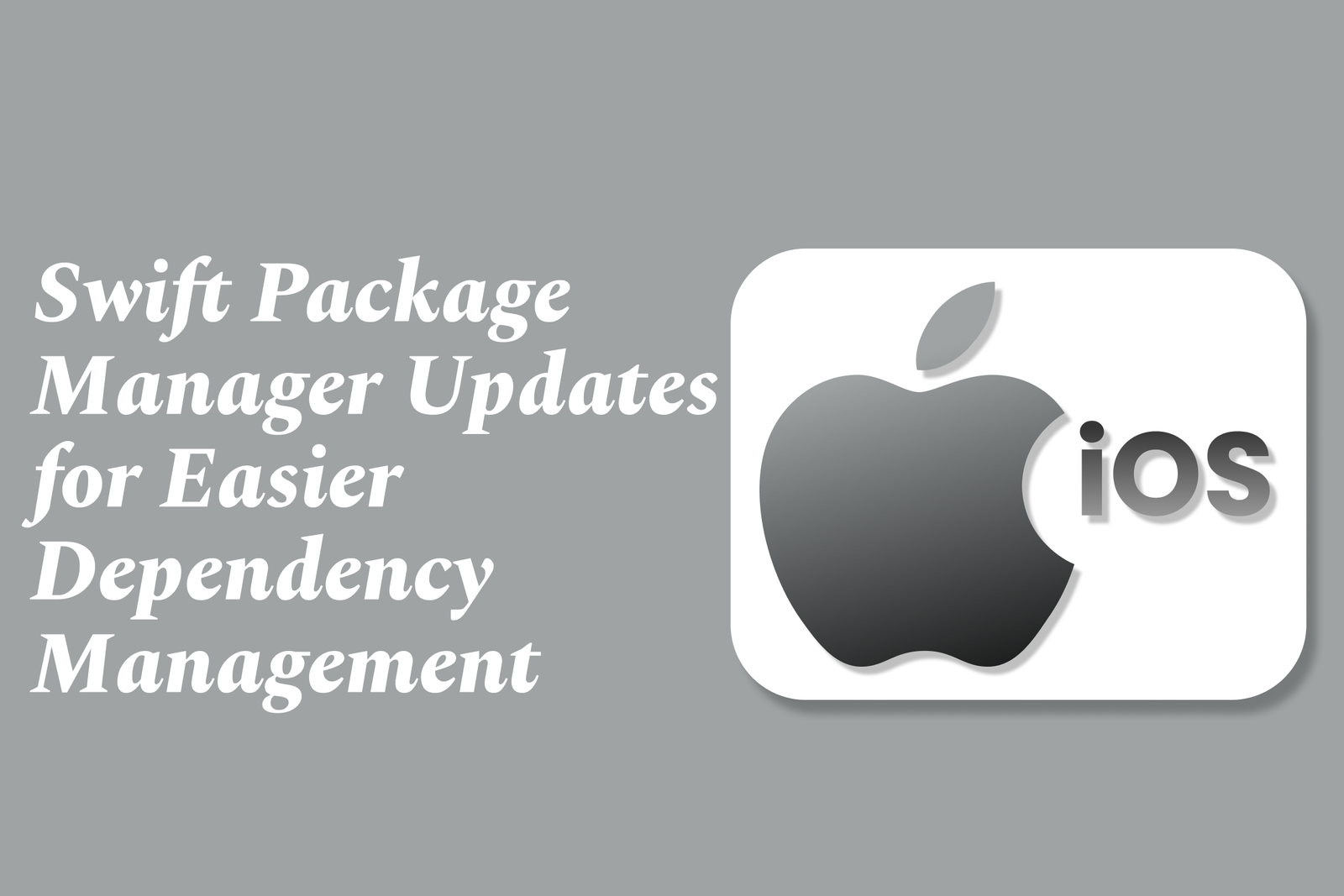Swift Package Manager Updates for Easier Dependency Management
Swift Package Manager updates streamline dependency management by improving Xcode integration, speeding up package resolution, and enhancing support for remote and local packages, making it easier for developers to add, update, and maintain dependencies efficiently in Swift projects.
Swift Package Manager Updates for Easier Dependency Management
1 ) Challenges with Swift Package Manager (SPM) in Xcode
Developers face difficulties updating targets, switching branches, or deleting dependencies within Xcode’s SwiftPM interface, which only supports adding and updating.
For Xcode projects (xcodeproj), managing dependencies is possible via the “Packages” tab, but users sometimes struggle to find or use it properly.
Frequent frustrating “Resolve packages” processes occur, especially in complex monorepos, causing hangs that impact developer productivity.
SPM has issues with remote dependency management: errors with SSH, Git, caching, and slow or failed downloads often force teams to revert to other tools like Carthage for external dependencies.
Lack of robust configuration options (such as differing build settings per environment) hinders use of SPM in complex settings.
Xcode performs resolving packages even for local dependencies frequently, including on file addition or switching branches, leading to slow builds.
2 ) Advantages of Using Swift Package Manager
Integration with Xcode improves workflow by eliminating the need for extra files like Podfiles, making dependency addition straightforward via the UI.
No need for maintaining or publishing podspec files; tagging git releases is sufficient.
Being a first party open source solution, SPM works well with CI systems without installing additional software.
Xcode cleanly displays package dependencies and versions within the project.
Working with private packages is simpler by linking directly to private repositories, avoiding burdensome private specs repos.
Package.resolved files are stored within project directories, facilitating source control integration.
3 ) Managing Swift Packages within Xcode
For pure Swift package projects, editing the Package.swift file directly is recommended and changes are detected by Xcode.
For Xcode projects, users can modify packages via the “Packages” tab found in the project editor.
To update remote dependencies linked to branches (e.g., “master”), Xcode’s menu option File > Swift Packages > Update to Latest Package Versions refreshes packages.
Common operations like adding files can trigger package resolves, which may slow development; currently, there is no official way to disable or manually control these resolves.
4 ) Creating and Using Custom Swift Packages
Swift packages promote modularity and reusability by allowing code to be shared easily across different Xcode projects.
Creating a new package is simple via Xcode’s File > New > Package menu with a guided setup.
Packages can be targeted for various platforms with minimum deployment versions declared in Package.swift.
Packages integrate smoothly by adding them under project’s “Frameworks, Libraries and Embedded Content”.
Organizing package source files in well structured folders within the package enhances maintainability.
Updates to the package propagate consistently throughout all projects using it, facilitating centralized updates and better collaboration.
5 ) Summary: Current State and Outlook
While Swift Package Manager significantly simplifies dependency management compared to older tools like CocoaPods, it has shortcomings in handling complex or large scale projects, particularly around performance and configuration agility in Xcode.
Frequent “Resolve Package” delays, limited environment specific build configurations, and instability with remote dependencies challenge developer workflows.
Despite these issues, SPM remains an appealing first party, integrated tool that streamlines basic dependency management and encourages modular code sharing.
Developers and teams often supplement SPM with other tools or local binaries to work around current limitations while awaiting further improvements in Xcode and SwiftPM stability and features.
https://justacademy.in/news-detail/android-security-vulnerability-patches
https://justacademy.in/news-detail/google-play-store-policy-changes-2025
https://justacademy.in/news-detail/android-app-analytics-tools-news
https://justacademy.in/news-detail/android-device-update-policies
https://justacademy.in/news-detail/is-react-native-still-competitive-with-flutter?
Related Posts
Java supports GDPR and data privacy by enabling secure data handling through encryption, controlled access, and precise data management. It allows developers to minimize PII exposure, ensure data confidentiality, and design workflows that comply with data protection regulations effectively.
Java code quality tools have evolved to include advanced static analysis, integrated security checks, and AI-powered code reviews. These updates help developers detect bugs, enforce coding standards, and enhance security, streamlining the development process and improving overall code reliability.
Java remains a cornerstone in big tech companies, evolving with modern features like records, pattern matching, and virtual threads. Its robust ecosystem, enhanced performance, and growing AI integrations keep it vital for both legacy systems and innovative new projects.
Java and CI/CD pipeline optimizations streamline Java application development by automating builds, tests, and deployments. They improve efficiency through parallelization, caching, and secure secrets management, enabling faster feedback loops and more reliable, scalable software delivery.
Java supports modern cryptography standards through its flexible Java Cryptography Architecture (JCA), enabling integration of advanced algorithms like AES, EdDSA, and post-quantum tools. Libraries like Bouncy Castle offer FIPS-certified, hardware-accelerated implementations for secure development.
Java 23 enhances record patterns by enabling concise, direct destructuring of record components within pattern matching, simplifying type checks and data extraction. This improvement boosts code readability and expressiveness by reducing boilerplate in handling immutable data classes.
Java remains a top choice for mobile app backends, powering scalable, secure, and high-performance server-side solutions. Latest trends include cloud-native microservices, reactive programming, and enhanced JVM optimizations, enabling efficient, flexible, and robust mobile backend development.
Java SE 24 and LTS Java SE 21 offer enhanced features and performance, while Apache Spark 4.0.0 introduces Scala 2.13 support and advanced ML and SQL capabilities. Together, they empower developers to build scalable, high-performance data applications with modern tools.
JUnit 5 modernizes Java testing with a modular architecture, improved assertions, and seamless Java 8+ support. Beyond JUnit, tools like Mockito and AssertJ enhance mocking and assertions, creating a powerful, flexible ecosystem for writing clean, efficient Java unit tests.
Java plays a pivotal role in cloud automation tools by providing a robust, platform-independent language used to build scalable automation frameworks like Jenkins and Selenium, enabling efficient CI/CD pipelines, testing, and orchestration across diverse cloud environments.










